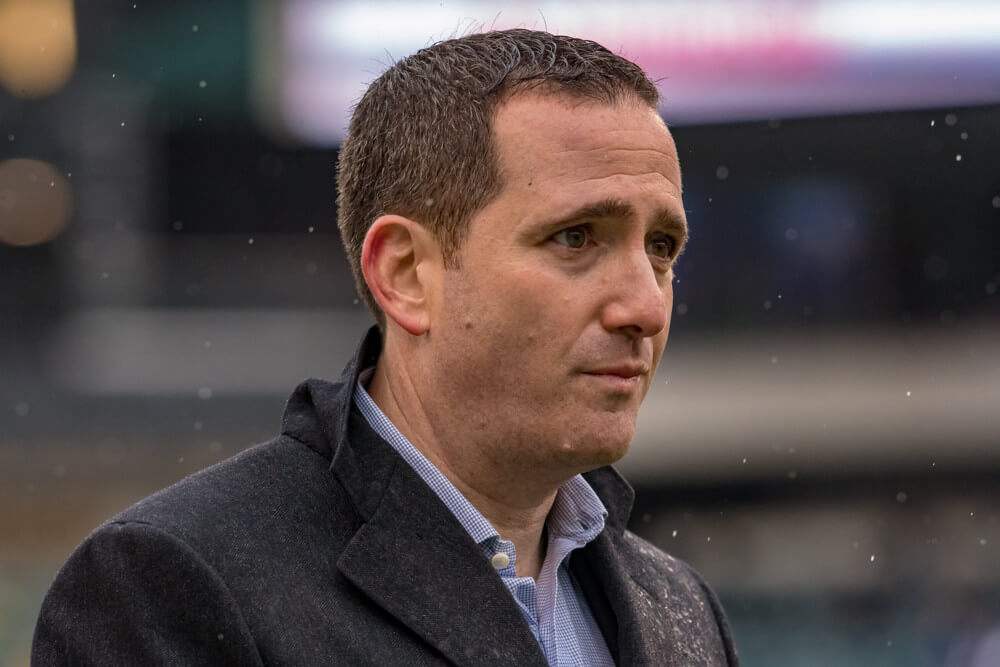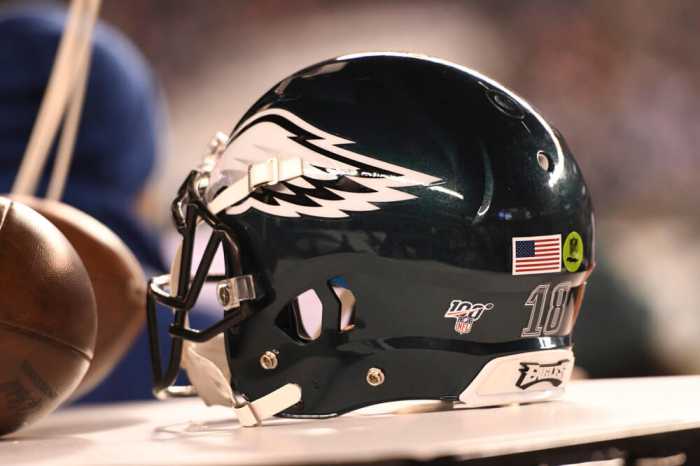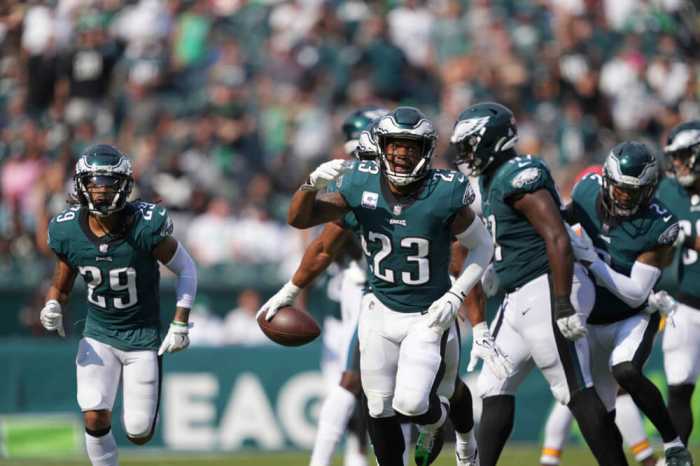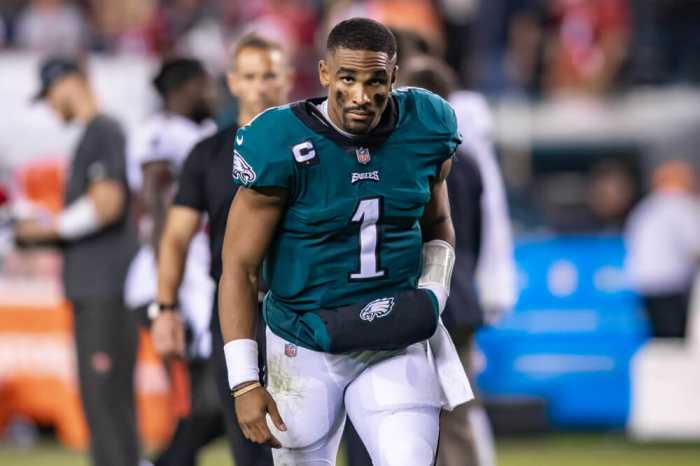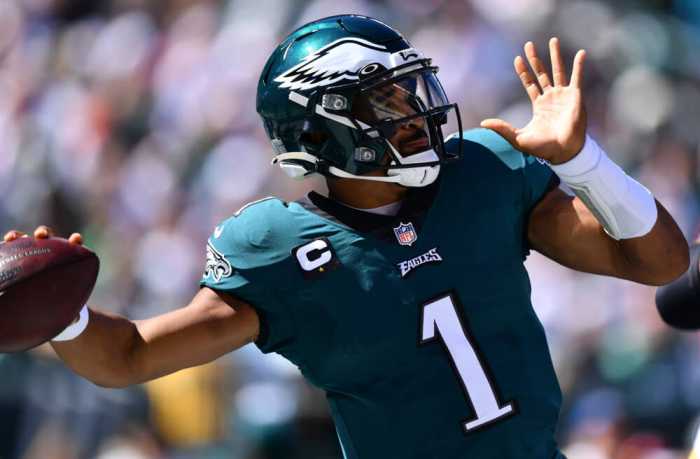General manager Howie Roseman deserves credit for making two major trades during the 2021 offseason and ensuring that the Philadelphia Eagles are in a favorable position for the 2022 NFL Draft with the 15th, 16th, and 19th overall picks.
In arguably his best move since the 2018 offseason, he traded the sixth-overall pick and a fifth-round pick in 2021 to the Miami Dolphins for the 12th-overall pick and a fourth-rounder in 2021 along with Miami’s first-round pick in 2022.
The Eagles drafted DeVonta Smith 10th overall after a trade with the Dallas Cowboys on draft night. The Eagles likely had their sights on the reigning Heisman Trophy winner all along, so they ultimately walked away with a future first-round pick without hurting the shape of their own draft board.
Roseman’s shrewd move and Smith’s promising rookie season in 2021 have led to speculation about the possibility of a similar deal taking place to set the Eagles up for better draft positioning in 2023. However, they must weigh the pros and cons of the situation and evaluate their potential net gain before recreating the strategy.
Cons- Flawed Logic
Philadelphia’s outstanding improvement in draft capital from the trade with Miami makes the deal look like a win, but the thought that the same strategy can simply be recreated to produce more positive results isn’t fully logical.
In a theoretical scenario, if the Eagles traded back one spot in the first round of every draft in exchange for a future first-round pick, they would get a tremendous gain at the expense of their trade partners. Successfully repeating the strategy would give them the most luxurious stock of first-round picks in NFL history.
However, they would never benefit from the strategy. Each trade would individually look like a success, just like Roseman’s trade with Miami currently does. However, the net gain would never materialize into a player capable of helping the team win, just like the promise of future draft picks didn’t help the Eagles compete in 2021.
The scenario relates to the bigger picture of how draft picks aren’t always valued accurately in discussions about building rosters in the NFL. These picks must be executed properly if they are ever going to provide an organization with a true net gain.
The same logic applies to the evaluation of the trade that sent Carson Wentz to the Indianapolis Colts for a conditional future draft pick in 2022 and a third-rounder in 2021. Wentz legitimized some of his critics with a poor performance down the stretch for Indianapolis this season, and he stayed on the field long enough to meet the conditions of the trade so that the Eagles secured the Colts’ first-round pick in 2022.
The deal looks like a win for Roseman right now, especially considering the lack of leverage he had in the situation involving Wentz. However, proper evaluation of the trade requires a larger perspective. A future conditional draft pick comes with three qualifiers.
- Future: Possession of that pick didn’t help Nick Sirianni win any games in his first season as head coach.
- Conditional: There was no guarentee the Eagles would get the first-round pick. They were fortunate that Wentz stayed healthy and met the conditions, but any future trade for a conditional pick would come with similar risk.
- Draft Pick: The enormous uncertainty of player development in the NFL leaves the chance that highly-touted prospects won’t materialize into key contributors, and even the players who develop well don’t always do so right away. The franchise’s recent history with Jalen Reagor, Andre Dillard, and J.J. Arcega-Whiteside has proven as much.
The third-round pick acquired in the Wentz deal did ultimately give Roseman an asset to trade to the Cowboys for the pick to select Smith. The partial role of that pick in acquiring the team’s leading receiver in 2021 is, at this point in time, the only net value the organization has gained from Roseman’s two blockbuster trades last offseason.
Pros- Future at QB
The hottest topic surrounding the Eagles offseason in 2022 is the future of Jalen Hurts as the starting quarterback. During his postseason press conference, Roseman finally gave Hurts the vote of confidence that had been lacking for the past year.
However, his words don’t mean that the Eagles don’t have a wandering eye for a new quarterback.
Historical tendencies are better indicators of future front-office strategies than a GM’s public statements. The Eagles have always prioritized finding a top-tier quarterback as the foundation of their franchise, and this desire will outweigh any other priority in building their roster.
They will almost certainly continue to look for that player considered to have a higher ceiling as an NFL quarterback than Hurts, and the organization’s plan for the future of the most important position in the sport will also dictate their strategy in the 2022 NFL Draft.
Part of Roseman’s strategy in dealing Wentz was to leave the organization in good shape to acquire a top-tier quarterback down the road. He has the flexibility to select a quarterback with one of the first-round picks in 2022, trade one or multiple picks to position the Eagles to select a quarterback in 2022 or 2023, or trade one or multiple picks to acquire an NFL veteran.
Most draft experts do not consider the 2022 NFL Draft to be deep with quarterbacks, which lessens the likelihood of Roseman selecting a quarterback with a first-round pick in April. However, if he determines that Philadelphia’s draft capital can help him find a top-tier NFL quarterback in the 2023 draft, he will likely pull the trigger on a similar deal to the one he made with Miami in March 2021.
Will the Eagles make a trade?
The outcome ultimately hinges on Roseman’s evaluation of the 2022 and 2023 quarterback draft classes. If he deems that the prospects in 2022 don’t have a legitimately high ceiling in the NFL, he shouldn’t spend a first-round pick on any of them.
He would then be left with a choice between:
- Selecting a player at one Philadelphia’s many other positions of need who would provide the roster with a net gain in 2022, OR
- Making a trade to prioritize the option to draft a prospect from the 2023 quarterback class.
Trading for a pick in 2023 would delay the possibility of maximizing the net gain from either of his two major trades during the 2021 offseason until the beginning of the 2023 season.
“It’s always an equation of if there is a guy on the board we think has incredible value for that pick, whether it’s in the first round or second round, if we have a group of guys that we value similarly and we can move back.”
-Howie Roseman
The “equation” rests in his ability to identify and draft talent, which has been the most scrutinized issue of the past four seasons of Eagles football. It will determine the direction of the Eagles moving forward.
Photo by John Jones/Icon Sportswire

